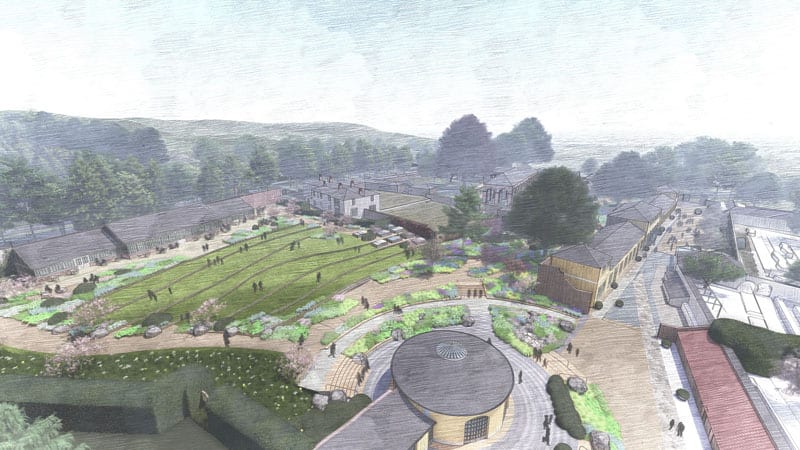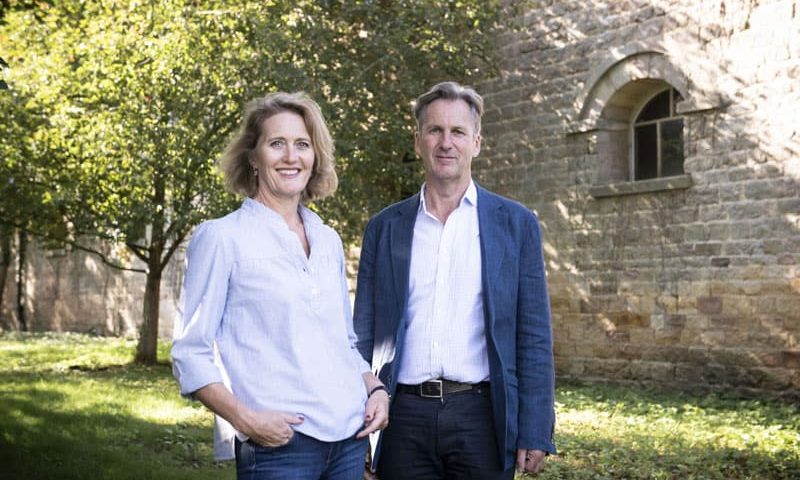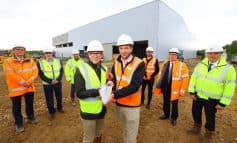Raby Castle, which has stood as a landmark within County Durham for 700 years, has announced the full extent of its significant investment to enhance the visitor experience of the castle, park and gardens, securing it as an important resource for the region.
The ambitious plans for a two-year major development programme, which were passed by Durham County Council in December last year, will restore and preserve historic buildings within the park and gardens, which have been without purpose for decades.
The development, which has been over three years in the planning, will also support an enhanced visitor journey for Raby Castle, park and gardens – providing contemporary spaces for enjoyment but also creating new vistas to the castle within a hub of activity.
The dynamic scheme, known as The Rising, will re-purpose heritage buildings as well as introduce new structures to provide stylish events and exhibition spaces, retail and dining experiences and a visitor information hub – which will all be available without having to pay an entry fee.
Newly-designed walled gardens, soft landscaping, and new entrance car park will reposition Raby Castle Park and Gardens as a historical and cultural asset for local communities to be proud of.
The first phase of The Rising scheme will also see the design and build of a bespoke children’s adventure play area to the north of the castle, on the site of the present Christmas tree plantation.
The playground attraction, planned to be open for Easter 2022, will also include a refreshment kiosk with a stargazing deck on the roof, perched amongst the trees.

A computer generated image (above) shows how The Rising development my look.
Lord Barnard, whose family home is Raby Castle, has been determined, since his tenure began in 2016, to make the historic landmark an enjoyable and accessible haven for local people, as well as those visiting the county nationally and internationally.
“The feeling was that Raby Castle and Park has been a visitor attraction for a long time and visitors even since the 18th Century have come here, but somehow it seemed to me that Raby was still very much under the radar, and it has a huge amount to share,” said Lord Barnard, pictured above with La Barnard.
“One of the first things we did was change the paywall, so visitors could enjoy the facilities as well as part of the castle grounds without having to buy a ticket, which felt to us like a much more welcoming experience.
“So, our motivation for this scheme is to really open up the castle and the estate to a great many more people to enjoy.
“Raby Castle is the flagship of the dale and we wanted to create something that would make people really proud, where they can bring their friends and family and enjoy everything we have to offer.”
The Rising will provide visitors with an enhanced experience, and also provide new, and potentially unexpected experiences to engage, inform and inspire.
From the point at which a visitor leaves the new car park, they will be guided naturally towards a hub of activity.
Lord Barnard said: “If you’d arrived in the 1970s, you’d have thought it was a nice place for a cup of tea – that was fine for then, but now it’s time to move on. We felt, apart from opening up the castle’s potential, we also really needed to look after people in a better way as well.
“So, the new Vinery café and restaurant will provide what we hope will be an attractive place to enjoy good food with a stunning view of the castle in the foreground, before taking a stroll through the new Duchess Walk – and all without having to pay for castle entry.
“With a new generation it is time for a new beginning, and we want to make sure that Raby is preserved for future generations to enjoy as well as our own,” said Lord Barnard.
The renovation and development of The Rising will be an important two-year phase of a progressive five-year business plan – bringing together a programme of conservation, restoration, repair and upgrades to historic buildings such as Gainford Hall, Raby Castle Park & Gardens, Unthank, Spring Hill Cottage, The Scar Farm, Bowlees Farm, Beck Foot Farm and Hilton Hall.
A fundamental strand of the renovation project is a commitment to greater engagement with local communities. Training and community educational programmes, as well as social and charitable events will continue to be supported.
Phase one of The Rising development programme will begin later this year, led by the senior development team and the appointment of a project manager to strategically deliver the build, which is due to be completed in 2023 and open to the public.








